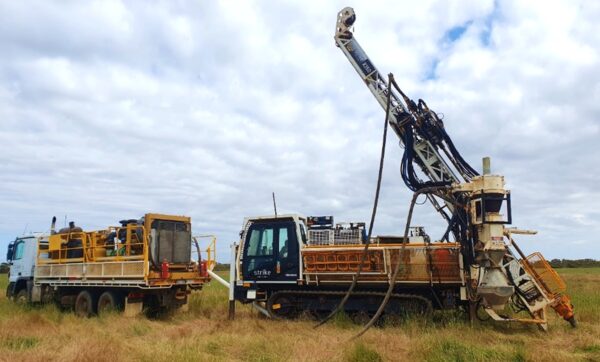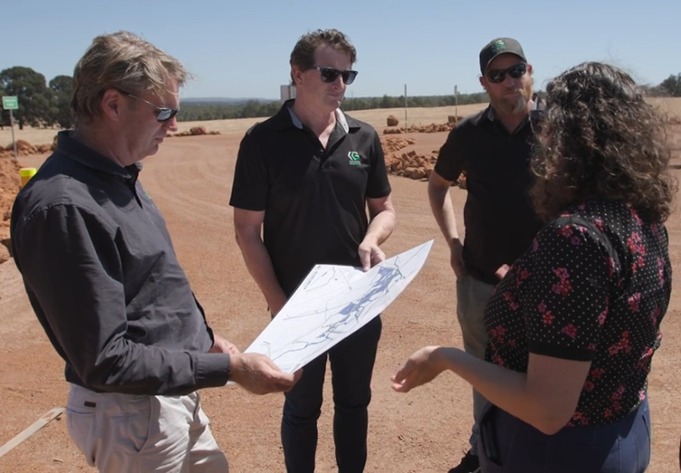International Graphite has selected the preferred site for its proposed Collie graphite battery anode material (BAM) manufacturing facility, signing a non-binding memorandum of understanding on a ‘strategically located’ 20-hectare site near Collie in Western Australia’s (WA) southwest.
The Perth-based company said it is negotiating a lease of up to 40 years on the privately owned site in the Coolangatta industrial precinct about five kilometres northeast of the Collie town centre. The lease comprises an initial 20-year period with an option for a second 20-year term.
International Graphite Managing Director and Chief Executive Officer Andrew Worland said securing the Collie site was a significant milestone in the development of the plant which would process graphite, a key ingredient in the production of lithium-ion batteries.
“The land is cleared, well served by sealed roads and civil infrastructure, with ample space to accommodate our initial design and future expansion plans,” Worland said. “Most importantly, it is only metres from the existing power network which gives us the opportunity to purchase energy at the lowest possible transmission cost.”
In addition to being close to existing transmission infrastructure, Worland said the 20-hectare site has “sufficient area to consider installation of a solar facility” with access to cost competitive power a cornerstone of the company’s business plans.
The transaction has been franked by the federal government’s announcement that it will provide $4.7 million (USD 3.13 million) to International Graphite to support the project and follows the company’s release last month of its scoping study which highlighted the “outstanding” economics of developing its proposed BAM manufacturing facility.
International Graphite said the Collie facility has been designed in modular fashion so it can be implemented in stages with the company aiming to first produce uncoated periodised purified graphite (USPG). This first USPG facility would then be expanded to involve carbon coating, ultimately producing coated spheroidised purified graphite (CSPG).
The company anticipates its completed facility would be capable of producing up to 40,000 tonnes per year of graphite concentrates.

Image: IGL
International Graphite’s scoping study was based on purchasing graphite concentrates from a third party but the company is ultimately planning to vertically integrate its business and use the output from its Springdale Graphite Project near Hopetoun, on WA’s south coast, to provide the feedstock for the Collie downstream processing plant.
The company plans to process its Springdale-sourced ore at its Collie processing facility, about 450 kilometres from the deposit. The procedure will allow it to transform the raw graphite into a battery grade material.
International Graphite has said it aims to have a definitive feasibility study for the Collie graphite BAM facility in the third quarter of 2024.
The project has received support from the federal and state governments with Australian Resources Minister Madeleine King on Thursday announcing it is one of 13 projects to share in almost $50 million in grants designed to accelerate the development of the country’s critical minerals sector.
King said the 13 projects to receive funding under the Critical Minerals Development Program grants include plans to produce key inputs to lithium-ion batteries for electric vehicles, and to support supply chains for advanced manufacturing for aerospace, medical, energy and defence applications.
“The successful projects will create jobs and opportunities across regional Australia and help Australia realise its ambitions to be a clean-energy superpower,” she said. “The grants will support Australia’s new Critical Minerals Strategy, to be released shortly and which will outline how Australia can capture the significant opportunity of growing its critical minerals processing sector.
“Australia has remarkable potential to meet the increasing global demand for the critical minerals needed for clean energy technologies, such as electric vehicles and batteries, as the world moves to decarbonise.”
International Graphite’s plan to establish its processing facility at Collie continues the transition of the town which has been at the centre of the state’s energy generation for more than a century.
Collie, at the heart of the South West Interconnected System (SWIS) which delivers electricity to metropolitan Perth and into the Mid West, South West and Kalgoorlie-Goldfields regions, has powered WA since the 1880s with its two coal mines.
But with the state government having announced plans to exit coal-fired power by the end of the decade, the town has become the focal point for WA’s transition to renewables.
Last week state-owned energy utility Synergy announced it will build a battery energy storage system at Collie, which the state government said will be one of the biggest battery systems in the world. The 500 MW/2,000 MWh Collie battery is due to commence operations before the end of 2025 and comes as International Graphite also assesses the feasibility of establishing its own large-scale battery.
International Graphite said it also has a non-binding memorandum of understanding with Zen Energy which is assessing the feasibility of building a 200 MW, 600-800 MWh battery at Collie.
French renewable energy giant Neoen has also identified Collie as an ideal location, having already secured development approval to build a 1 GW/4 GWh big battery there. Neon said the project will include five individual 200 MW/800 MWh battery compounds with a total combined output of 1,000 MW/4,000 MWh. The project will be constructed in 200 MW/800 MWh stages with Neoen predicting the facility will be operational “by or before 2025.”
This content is protected by copyright and may not be reused. If you want to cooperate with us and would like to reuse some of our content, please contact: editors@pv-magazine.com.









By submitting this form you agree to pv magazine using your data for the purposes of publishing your comment.
Your personal data will only be disclosed or otherwise transmitted to third parties for the purposes of spam filtering or if this is necessary for technical maintenance of the website. Any other transfer to third parties will not take place unless this is justified on the basis of applicable data protection regulations or if pv magazine is legally obliged to do so.
You may revoke this consent at any time with effect for the future, in which case your personal data will be deleted immediately. Otherwise, your data will be deleted if pv magazine has processed your request or the purpose of data storage is fulfilled.
Further information on data privacy can be found in our Data Protection Policy.